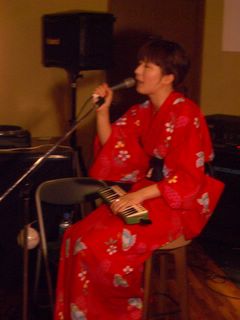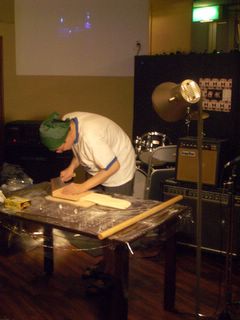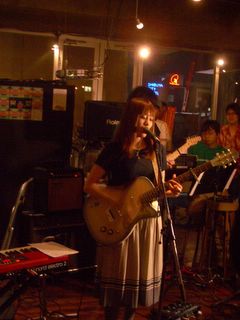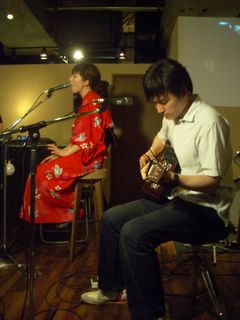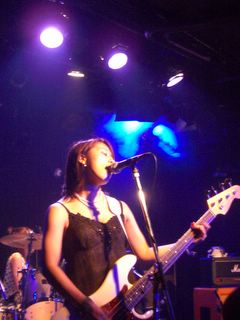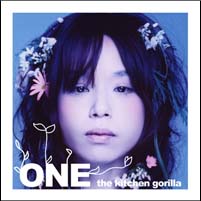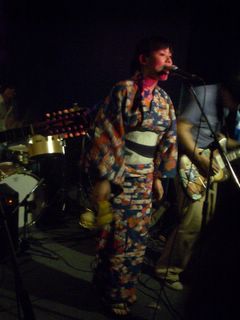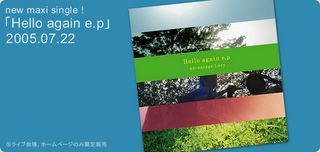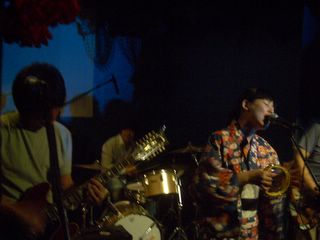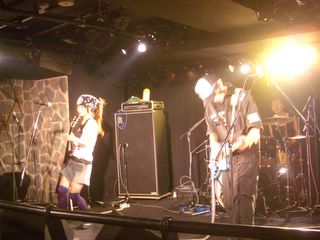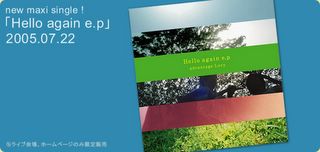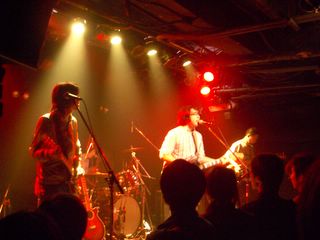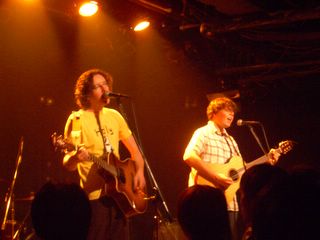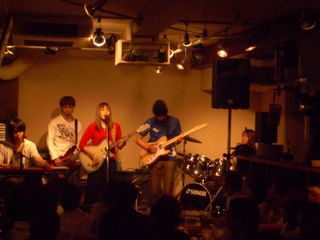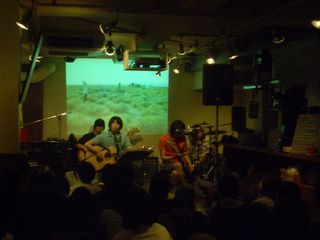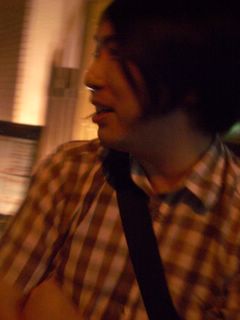
Plectrum's Taisuke Takata.

The rock quartet
Plectrum is without question one of my favorite Japanese live bands. Every time I go to their shows and watch them give it all they have, I feel infused with new energy. These four guys play everything from sweet ballads to scorching hard rock numbers—as singer Taisuke Takata says, “it’s as if we’re putting into a 30 minute show all of the Beatles’ music from their early days to their later period.”
A taste of what their shows are like can now be found in an excellent new live album of theirs called
Live 4 Live, released by
Mona Records. Listening to it made me want to talk to the band about the album and their live shows in general. So I arranged an interview with Takata, the band’s leader.
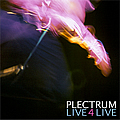
Live 4 Live

He turned out to be an interviewer’s dream. Whereas with some people, getting answers is like digging in dry ground for water, with Takata, each question would unleash a river of words, and all I needed to do was to direct their flow once in a while.
Plectrum has been around for about a decade. The group was originally based in Osaka and was called Star Sign, and consisted of four college kids in love with Teenage Fanclub. Listening to Takata talking about the band’s past, I came to understand how a great live band like Plectrum isn’t created in a day.
“At first when we did shows we’d always imitate Teenage Fanclub, for example we’d get together in front of a mirror (during rehearsals) and we’d go, ‘no, that’s not the way (Teenage Fanclub) raise their legs’, or ‘you should drum more aggressively (like Teenage Fanclub). Teenage Fanclub was really a model for us on how to do shows.”
“My favorite concert,” Takata says, “is one I didn’t see in person but it was one I saw on TV, the Redding Festival in 1992 headed by Nirvana. Teenage Fanclub played around noon, and even though they weren’t playing intense songs like Nirvana, (the audience) were having a blast, fooling around in the mud as the rain fell and stopped, and I saw that show and I thought, wow, I want to start a band, and I want to do a show like that one day.”
When his heroes toured Japan, Takata decided to meet the members of Teenage Fanclub and ask them to give his band a new name.
“We had named our band Star Sign after a Teenage Fanclub song, and because of that there was a bit of preconception (about our music), like, ‘oh, you guys are like Teenage Fanclub, right?’ and to get rid of that preconception we thought we should come up with a band name ourselves, but nothing would come to us, and so we thought maybe if we have the real guys name us no one would complain, so (Teenage Fanclub) gave us our name (Plectrum), and then the very next week we received an offer from Polystar Records. It was very lucky, it was miraculous timing.”
With a record contract and a new name, Plectrum felt on top of the world. But the tough realities of working as an up-and-coming major label band soon brought them back down from the heights.
“Teenage Fanclub’s performance at the 1992 Redding Festival was really so natural, and they seemed to be having fun, and it was ideal and I thought, we should do it like this, but it was difficult. There was a long period when live shows were a struggle… When we debuted (on the major label) we really had to think a lot, about every move we made on stage, and the director would tell us, ‘that move there wasn’t great’, and I’d think ‘yeah, he’s right’, but the more I thought about it the less I became able to sing. There was a period when we decided to take a break from live shows for a while, and we hardly did any shows for two or three years.”
“Plectrum and Rockin’ On Japan (magazine) planned a thing where we’d do a solo show four months in a row, and at each show we’d do five new songs, and then out of the twenty songs we made we’d pick ten songs for a new album. But that made our drummer mentally exhausted. We’d been doing music for fun but now it felt like we were being forced to do it… Writing songs used to be like writing a diary for me, but now it felt like filling a quota. I had to write five songs a month, and not only that but also get them in good enough shape that we could perform them live, and the more I thought about it the more things seemed to fall apart. But then Akky [lead guitarist Akira Fujita] helped out by writing a lot of good songs too. Up until then I’d been writing almost all of the songs.”
The ten songs that Plectrum wrote were included in the album
Adventure of Pony Rider, released in 1998. Once that album came out, however, Plectrum faced a new problem: Polystar wouldn’t let them go on a tour to promote the album.
“That was the company’s policy. I guess they felt that our shows weren’t that good, since I was having trouble singing. And touring costs money, and I think they wanted that CD to make it on its own. But, all those songs were written for shows, and now (that the album was completed) we couldn’t play them at shows. While we understood the company’s policy, it left us dissatisfied.”
That and other problems eventually led to Plectrum quitting Polystar and working under Yoshimoto Kogyo, an Osaka entertainment company famous for its line-up of comedians. In 2000, they released
Colombia, an album that begins with the hard-rocking ‘Night Patrol’ and ends with the gorgeous ballad ‘Bookend’. Takata said it’s from this period that the band mixed rocking tunes and mellow ballads when doing shows.

Plectrum, live!

“I sometimes think that what we do at live shows controls Plectrum’s music. When
Colombia came out, there was all the frustration we felt from not being able to do shows (under Polystar), there was all the music that had spread inside my head, from intense to mellow songs, that was
Colombia, but then when we did shows we felt good playing mellow songs like ‘Uptown Girl’ (from
Colombia), and when we decided to play in a relaxed way like that at shows we ended up with (the album)
Sorry (released in 2001), but then around the time of
Sorry we thought we want to express ourselves more, and bring ourselves out more, and that was
Prom Night.”
But
Prom Night, released in 2004, was, in spite of being an outstanding album with standout songs like ’30 Boy’, ‘Sundae Champion’ and ‘Star Light’, a source of frustration business-wise.
“
Prom Night was a very unfortunate album… The sound was good, the songs were good, and our intensity was good, but because of troubles with the label we couldn’t really advertise it that much.”
Their problem, Takata said, was the new record label that released the album. It was run by a design company with no experience producing music, and the label didn’t market the album enough. The company soon shut down the label.
But despite the troubles with the label, Plectrum went on playing the songs from
Prom Night in one exhilarating show after another. They also crossed the sea twice in 2004 to play in Seoul, first in March with
advantage Lucy,
Miniskirt and
Lost in Found, and a second time in September with
Swinging Popsicle. They were awed by the positive reception from the Korean audience, almost none of who had heard of Plectrum before the band’s first Seoul tour. Plectrum’s first visit left such an impression with the Korean fans, in fact, that a fan club of a couple of dozen people sprang up in Seoul soon after the band’s return to Japan.
“Going to Korea made us understand what it must be like to be the western musicians (visiting Japan) that we go to see. The way, when a band like Teenage Fanclub tours Japan, the fans would scream when they said ‘
konnichiwa’, it was the same when we would say ‘
anyonghaseyo’ (on stage in Seoul). It made me want to study Korean, it’s a very beautiful language.”
“A big factor (in Plectrum’s decision to release a live album) was what we experienced in Korea. People there didn’t know our music, but when we played good shows we found out that they’d really get into our music.”
One of the people who watched Plectrum play at this time, the owner of indies label Mona Records, suggested that they put together a live album, and they agreed to do it. They started and ended the album with performances in Seoul, and, in between, put in songs played at a number of shows in Japan.
They considered various titles for the album, but none of them sounded right.
“We thought something like ‘Live, Live, Live’ might be good, and we wanted a number in the title, something that reflects that we’re four people, and putting all that together, Akky came up with
Live 4 Live, which we thought was stylish.”
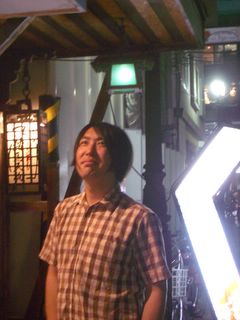
Plectrum's Takata.

Plectrum’s live album
Live 4 Live starts with a song called ‘Myongdong Calling’, recorded at a show in Seoul. The title is a playful reference to the Clash’s London Calling.
“When I thought up the title ‘Myongdong Calling’, I thought to myself, ‘I win!’ It was a fun title. I thought it should be the first song (on
Live 4 Live).”
The finale of
Live 4 Live is an extraordinary recording. It’s the song ‘Till I Die Again’ from
Prom Night, but at first all you hear is a crowd singing it together as one big chorus, and only toward the middle of the song are the amps turned on and it becomes a rock tune.
This is the moving musical moment I’ve
written about a couple of times before: the sound went out during Plectrum’s show in Seoul, but instead of stopping, Takata continued performing without the amp and mike, and the Korean crowd sang along to a tune in Japanese that most probably hadn’t even heard before.
“That really made me glad I’d been doing music, and I also felt this is why I can’t stop being a musician. How can I say this, I guess if you’re just working on your own, making home recordings, well, not to say you’re self-satisfied, but you can quit something like that anytime, but when you do a show the feeling is that you do the show with everyone in the hall, and what’s good about a live album is that everyone is making noise, and the important thing is everyone’s voice or everyone’s applause, and I think shows matter because of those things.”
The big ‘Till I Die Again’ chorus in Seoul “I think was a present from god, and it was a moment when I felt good about continuing this band for so long.”
